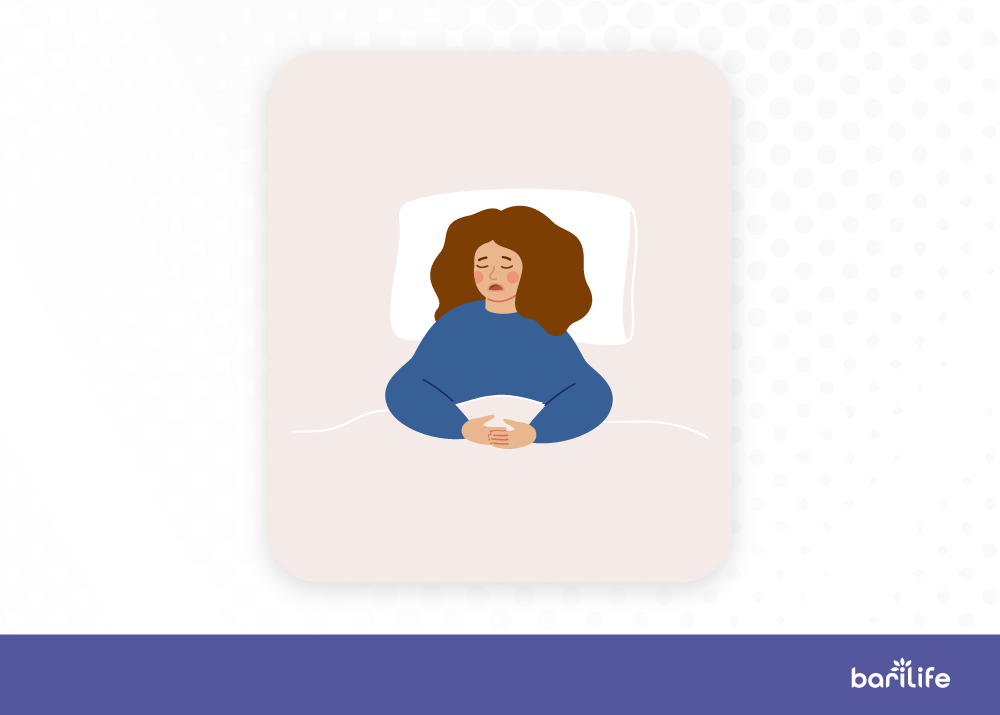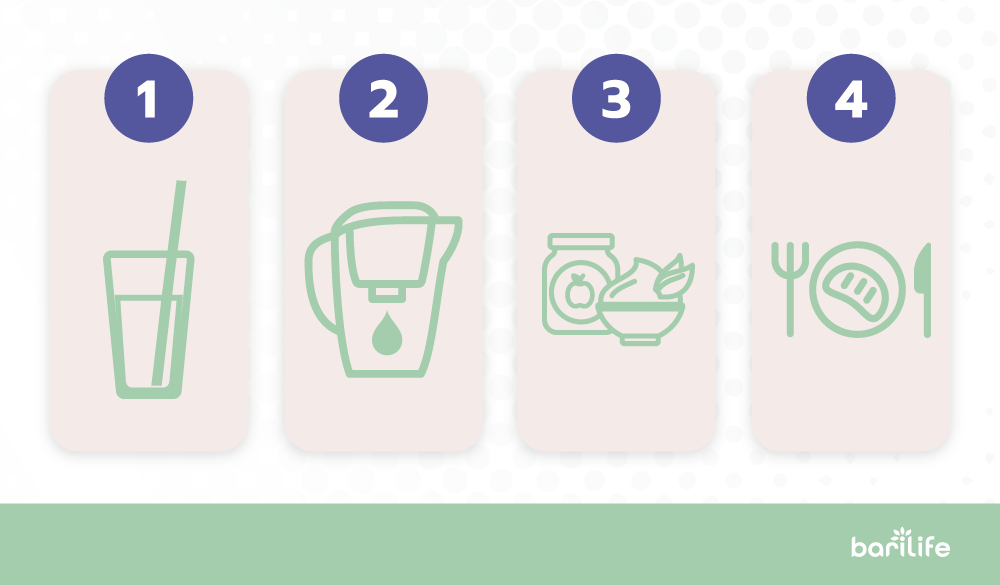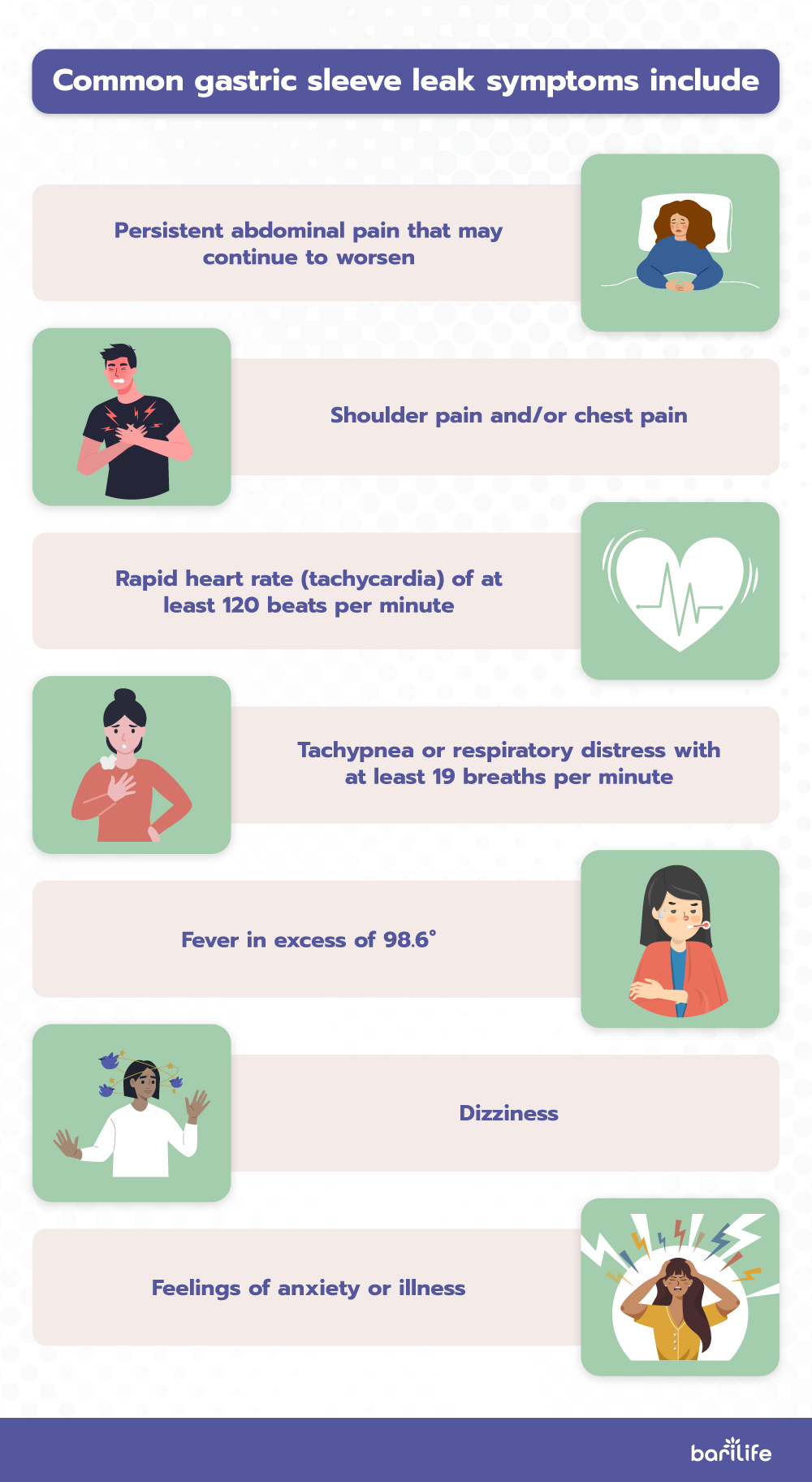Gastric sleeve surgery is a popular weight loss surgery that involves removing a portion of the stomach to reduce the amount of food you can eat. While it can be an effective way to lose weight and improve related health conditions, it is also a major surgery that can cause pain and discomfort after the procedure.
One common complaint among gastric sleeve patients is pain after eating. This is often because the surgery involves cutting through the stomach muscles, which can be painful. The pain may be particularly pronounced after a meal, as the process of digestion can cause the stomach muscles to contract and expand. Keep reading to learn more about what is normal, what isn’t, and when to contact your surgeon.

What is gastric sleeve surgery?
A sleeve gastrectomy is one of the most commonly performed bariatric surgeries. The procedure is often performed laparoscopically. The surgeon inserts small surgical instruments through small incisions in the upper abdomen. A sleeve gastrectomy removes about 80% of the stomach and leaves a tube-shaped stomach about the size and shape of a banana.
Successful weight loss often results from gastric sleeve surgery because it decreases the stomach size, which helps people to feel full more quickly, thus consuming fewer calories. It also changes hormone levels that regulate hunger and satiety.
Gastric sleeve pain after eating
If you have recently had gastric sleeve surgery, you may be experiencing pain after eating. While this can be alarming, rest assured it is normal to experience some pain and discomfort after eating. This can occur for many reasons.
One of the main reasons pain may occur is that the surgery involves cutting through the stomach muscles, which can be painful. The pain should gradually decrease over time as your body heals, but in the meantime, you may find that it is uncomfortable to eat.
Other reasons for pain after eating include:
- Not following prescribed diet
- Eating too much
- Eating too quickly
- Gas
- Indigestion
- Constipation
- Dumping syndrome
- Gastric sleeve leak
Post-op dietary recommendations
Dietary recommendations after surgery are very specific and are necessary for a successful recovery and to avoid complications. It is very important to follow the diet prescribed by your surgeon.
Immediately following surgery, you will follow a clear liquid diet. Your surgeon will tell you when it’s time to progress to a full liquid diet. Eventually, you will graduate to a soft pureed diet, and around 1 month after surgery, you will gradually start introducing solid foods.

Not adhering to these recommendations may result in pain after eating.
What is dumping syndrome?
Dumping syndrome after gastric sleeve surgery occurs when food is “dumped” directly from the stomach into the small intestine without being digested. There are 2 types of dumping syndrome: early and late. Early dumping happens 10 to 30 minutes after a meal. Late dumping happens 1 to 3 hours after eating. Each has slightly different symptoms.
Early dumping syndrome may happen because the food you eat is now being sent to your small intestine at an earlier stage of digestion. The intestines sense that the amount of food is too concentrated and undigested and begins to release gut hormones. The body reacts by pulling fluids that are circulating in the bloodstream to the intestine. As a result, the intestines become fuller and bloated, which may cause pain. Diarrhea often occurs 30 to 60 minutes later.
Additionally, some substances that are released by the intestine can adversely affect heart rate and blood pressure. This can lead to lightheadedness or even fainting.
Symptoms of late dumping happen because of a drop in blood sugar, also called reactive hypoglycemia. Reactive hypoglycemia is low blood sugar that occurs 1 to 3 hours after a meal.
Dumping syndrome is more likely to occur after eating a meal heavy in starches or sugars. The sugars can be either fructose or table sugar (sucrose). The body may produce too much insulin in response to this and then lower your blood sugar too much.
If you have not already been diagnosed with dumping syndrome, and you have confusion, dizziness, rapid heartbeat, or fainting, seek immediate medical attention.
Gastric sleeve leaks
Gastric sleeve leaks are due to an unintended perforation in the new stomach pouch, so in most cases, a gastric sleeve leak will occur early on during the post-operative period. Usually within 3-14 days of surgery.
Gastric sleeve leaks that occur more than 14 days after surgery are fairly uncommon. In one study of 2,834 patients, only 3 patients experienced a leak after 14 days. If you had your surgery less than one month ago and experience any of these symptoms, you may have a gastric sleeve leak.
The most common gastric sleeve leak symptoms include:
- Persistent abdominal pain that may continue to worsen
- Shoulder pain and/or chest pain
- Rapid heart rate (tachycardia) of at least 120 beats per minute
- Tachypnea or respiratory distress with at least 19 breaths per minute
- Fever in excess of 98.6˚
- Dizziness
- Feelings of anxiety or illness

If you have any signs or symptoms of gastric sleeve leak, contact your surgeon immediately or seek emergency medical care.
Managing pain after eating
While some pain after eating is normal and expected following gastric sleeve surgery, there are some things you can do to help manage the discomfort. You should always consult your surgeon before starting any new medications or treatments.
Here are a few tips that may help manage pain after eating:
- Take over-the-counter pain medication, such as acetaminophen, as directed by your surgeon or healthcare provider.
- Eat slowly and chew your food thoroughly. This can help reduce the amount of strain on your stomach muscles and make digestion easier.
- Avoid eating large meals. Instead, focus on eating smaller, more frequent meals throughout the day.
- Avoid foods that are difficult to digest, such as fried or fatty foods, until you have fully recovered from the surgery.
- Stay hydrated by drinking plenty of water. This can help flush out any leftover food particles in the stomach and improve digestion. However, don’t drink water with meals.
- Aim to wait 30 minutes after a meal before drinking.
When to seek medical attention
If the pain is severe or persists for an extended period of time, you should contact your surgeon or seek emergency medical treatment. Your medical provider will be able to evaluate your condition and determine the appropriate course of treatment.
Signs that you should contact your surgeon or healthcare provider include:
- Difficulty swallowing
- Nausea or vomiting
- Fever or chills
- Rapid heartbeat
- Shortness of breath
- Swelling or redness at the incision site
Conclusion
It is normal to experience some level of discomfort after have the gastric sleeve procedure. However, severe or persistent pain after eating can be a sign of complication and should be discussed with a healthcare provider.
To ensure a successful recovery and minimize the risk of complications, be sure to follow your recommended diet and take medications as prescribed by your doctor. Closely monitor symptoms and report any problems to your healthcare team.




What are your tips and tricks to post-bariatric success?